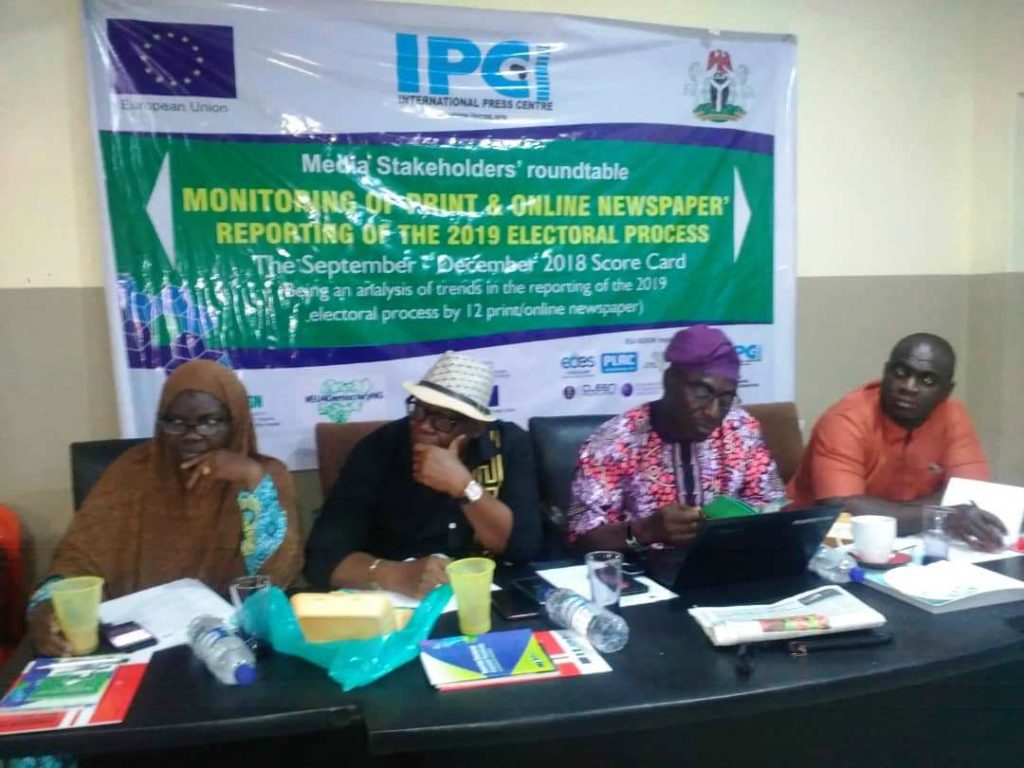Journalists have been advised to wear relevant accreditation tags and stay safe while covering the general elections starting on Saturday.
Director of the International Press Centre (IPC), Mr. Lanre Arogundade gave the advice at the presentation of a report of newspaper monitoring of print and online newspapers of the 2019 electoral process carried out by the IPC recently.
Urging journalists to be professional in discharging their duties during the elections, Arogundade said, “My appeal is that we must know that as much as we cover the politicians, our main duty is the people and we must mind the language we use in writing our reports.”
“A couple of weeks ago, we knew what happened at the APC rally in Lagos where some of our colleagues had gunshots injuries.
“The truth is that there are parts of this country on the basis of campaigns that you can project have a strong likelihood of violence,” he said, warning journalists to be careful in Ogun, Lagos, Rivers, Kano, Benue States and the north east.
“The kind of clothes and shoes you wear are important. It is not time to be fashionable. It must be a shoe or canvas with which you can run where needed.”
Arogundade also advised journalists to check their health status before covering elections. “You must check your health status. If you are going to cover the election in some of these places I mentioned, you must go to your doctor to check your blood pressure and if you see it is high, you must request another person is sent there,” he counselled.
“We want you to report alive, we don’t pray for you to be part of the election report. Ensure your management gives you appropriate tools to ensure you are safe. We have Google maps, make sure your immediate boss knows where you are per time,” he added.
Giving reasons his organisation embarked on the monitoring exercise, the former Chairman of the Nigerian Union of Journalism, Arogundade said, the exercise was necessary for the media to assess how it was doing in the discharge of its duties.
“Since the international organisations also monitor the Nigerian media, every account of happenings should not come from them alone. IPC also monitored the media because the public is interested in how well the media is doing.
“The fourth reason is that the outcome of the engagement is needed as tools of engagement and capacity building to achieve a credible election.”
Director, International Cooperation, Ministry of Budget and National Planning, Abuja, Mrs. Elizabeth Egharevba appreciated the European Union for sponsoring the laudable project.
Represented by Mr. Nwanze Afam, the Project Officer, EU-SDGN, Ministry of Budget and Planning, Abuja, noted that the media has long been recognised as a pillar of discovery and lifeblood of electoral process and must be commended.
Chairman of the Lagos State chapter of the NUJ, Dr. Qasim Akinreti appreciated the IPC for the project. Appealing to the journalists, Akinreti said, “International organisations monitoring the election would be in Lagos, Katsina and Adamawa. I want you colleagues to make us proud, don’t be partisan and be careful of the various flashpoints.
“It is not our making that politicians are fighting themselves but we must report them, so be careful. Violence has been predicted in some areas, we must be professional and careful,” he warned.
Reviewing the publication, Executive Director, Centre for Free Speech, Lagos, Mr. Richard Akinnola, noticed gender imbalance in some of the stories monitored.
“There is gender imbalance in the media reportage which we have noticed in this report. Apart from Dr. Oby Ezekwesili, I am not aware of any female presidential candidate,” he noted.
“The visibility given the female aspirants by the media has been so low compared to the men, however, I must commend the work, it is fantastic.
“One notable feature about the report is the coverage of the big parties at the detriment of the small parties that got insignificant percentages of coverage. The small parties have no financial capacity to influence things so they get smaller influence and scanty mention. The media should address this trend,” Akinnola advised.
Report by Dayo Emmanuel


